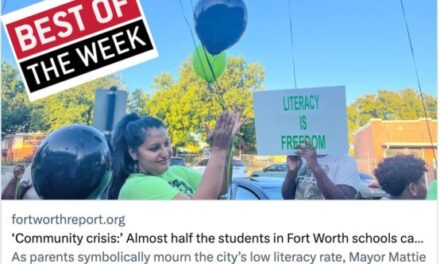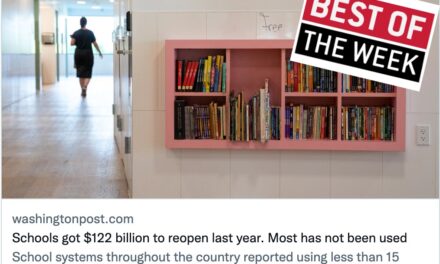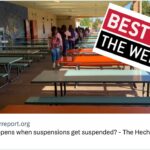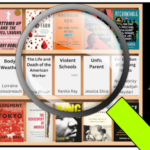By Evan F. Moore
In an era where “alternative facts” and “fake news” dominate the news cycle on a daily basis, the systemic issues in Chicago — arguably America’s most segregated and politicized city — could go unnoticed by the media outlets who cover education locally. Devastating layoffs at places such as the Chicago Sun-Times and the Chicago Tribune among others, can also have an adverse effect on the city’s education beat.
However, interviews with parents, teachers and a current Chicago Public Schools [CPS] student, along with a reporter who covers the education beat, reveal a range of views on how well local mainstream media is covering education in Chicago.
Some of those interviewed believe the reporting of education is spot on, while others want a greater diversity in how stories are told in terms of things like success stories and the voices of students who are directly affected. Many said that covering education in Chicago is much more complex that people think.
As the journalist son of retired CPS teachers, I would generally agree. Education reporters are doing good, important work in a very tough environment. Now if only they would get the credit they deserve.
“Our schools are being starved…” ~ Timothy Meegan via Chicago Sun Times on #education http://t.co/nUfXydVU8R pic.twitter.com/bUqvqBtgBQ
— Aliki Christou (@AlikiChristou) July 27, 2015
[Related post: Chicago Journalists Honored For Controversial Education Coverage]
Many of the stories covered by Chicago’s education reporters in recent years have focused on the closing of 50 public schools (the largest such event in American history) by Mayor Rahm Emanuel and the appointed school board, alleged dragging of the feet by elected officials to find a purpose for shuttered school buildings, union strife, protests, the rise of charter schools, violence nearby public schools, and the lack of a state budget for education locally among others.
Coverage of these events has not all been as independent as it should have been, according to some observers.
“Having taught in CPS for 10 years now and seeing both schools I’ve been at continue to be hurt by budget cut after cut is beyond offensive.” said Dave Steiber, a Huffington Post blogger who teaches at Chicago Vocational Career Academy.
“Meanwhile, far too many in the press like to report what [the] mayor, board & CEO [Forrest Claypool] says. The press will give CTU [Chicago Teachers Union] a voice but often just to shoot down its funding ideas. Plenty of money in this city just not for black and brown kids.”
For example, two months ago, the Chicago Tribune’s editorial board wrote a column called “ CPS and CTU:The War of Bad Ideas. In the column, the editorial board took a well-meaning tone about how the CTU has gone about dealing with the CPS. The Tribune’s editorial board said the CTU throws “tantrums” and they that were “cheating” children out of instructional time by threatening walkouts and strikes.
The editorial page also suggested certain times for the CTU to air their grievances to the CPS, which is typical of white people, and those in minority communities who cape for them, who will go to any length in order to downplay civil disobedience despite the fact that America was founded in a similar way.
.@WBEZeducation Learn more about how Illinois pays for public schools here: https://t.co/eCeMTtxCHR pic.twitter.com/0e4bCec22S
— WBEZ (@WBEZ) April 19, 2017
Sara Sayigh, the librarian at DuSable High School on the city’s South Side points to the coverage last year of a student-led “read-in” to protest her impending lay off as an example of the lack of funding at CPS schools. At the time, Sayigh was one of just three full-time librarians left in the city, according to the Chicago Teachers Union.
“I wish more had been made of the fact that I was one of only a few school librarians left on the South Side.” said Sayigh, or about “how the cuts to personnel are disproportionately affecting African-American children.” She points out that her school alone has already lost a nurse, social worker, counselor, and clerk. “This is typical of the kind of cuts to neighborhood schools,” Sayigh said. “People (including parents) seem to assume that any type of cut occurs in isolation and that if that one problem can be solved it is over. But it is systemic and I think, deliberate.”
Sayigh wouldn’t say which reporter or media outlet had gotten the story wrong. She said she would like to see reporting other than “surface” facts.
“I do not blame any reporter individually for this and in the last few years there have been more reporters connecting the dots,” said Sayigh. “Chicago has some excellent education reporters like Lauren Fitzpatrick, Sarah Karp and Ben Joravsky [Chicago Reader] has done his share also. It’s just kind of late.”
[Related post: More Kudos For Chicago Catalyst From CJR]
“I think more hyper-local reporting about education could change the narrative,” said Sheila Quirke, a CPS parent and award-winning blogger. “A narrative has developed about “big, bad Chicago Public Schools” tanking — horrible teachers, dirty schools, failing students. Nothing is that simple.”
“Where are the success stories? Who is speaking to individual principals? Where are the neighborhood schools making progress?,” she asked. “There is a monolithic approach to CPS [coverage] and it isn’t accurate. Selective enrollments are bad and elitist. Charters are awful, underperforming and money suckers. North Side schools are good, South and West Side schools are bad. I want more depth.”
[Related story:‘F The Police’ Speaker At Teacher Rally Not With CPS, But Union Takes Heat]
Mikki Kendall, a freelance writer and a CPS alumna, has two children who attends CPS schools. Like Quirke, Kendall says that she would also like to see more coverage on CPS success stories and the erosion of special education.
“CPS success isn’t covered well at all, especially at schools like Kenwood [Academy] with high graduation and college scholarship rates. There’s a myth the only successful programs are at charters and I think that undermines funding for public ed as a whole,” Kendall said. “I think better coverage of how many schools are undermined for years before they are called failing is also super important. Dyett [HIgh School] was a success story until they cut their funding for 10 years straight.”
[Related post: Indie Outlet Broke Chicago SUPES Scandal – Two Years Ago!]
Xian Barrett, an award-winning CPS teacher, said he believes that local education reporting is generally good, but the wrong questions are being asked.
“When we look at the utter dismantling of public education and New Orleans, Chicago and many other major cities, a lot of is based paternalistic institutional racism. The story should be how African-American teachers are being erased from public education,” Barrett said. “We as a society have a responsibility to address that. Let’s have a conversation on pushing black educators out of the workplace.”
A 2016 story on the erasure of black teachers in Chicago and New Orleans by Mother Jones called, “ Black Teachers Matter,” backs up Barrett’s claims. According to the article, between 2001 and 2012, the number of black teachers in Chicago dropped by 40 percent.
The Better Government Association, Chicago Crusader, WBEZ and the Austin News Weekly also wrote about the lack of black teachers in Chicago.
Barrett also thinks that the anti-testing “opt-out” movement was mis-covered by the media. “It was traditionally covered as white-led unions and white parents versus corporate reformers who openly say they are doing it for equity,” Barrett said. “What’s being missed in Chicago is that it was a movement where white parents jumped on board. I learned about opt out from students.”
“What’s being missed in Chicago is that [opt-out] was a movement where white parents jumped on board. I learned about opt out from students.” – Xian Barrett
Jennifer Nava, a freshman at Thomas Kelly High School on the city’s Southwest Side, took a much more harsher tone in criticizing the education beat in Chicago. She says that the people most affected by cuts in education are often left out of the coverage.
“Most press, I hate the way they cover education. They always have every word that comes out of an adult’s mouth, but the adults aren’t the ones that are truly getting affected first-hand by whatever happens to and in education. The youth are, but most of the time when youth speak up, it’s background music to whatever the adults have said,” Nava said in an email.
“I spoke in front of the CPS building downtown when people finally started making a fuss about how budget cuts were affecting the poor and minority population. I didn’t know I was going to speak so on the way there, I wrote a quick speech. During my speaking time, I began crying. I spoke about how these budgets were affecting everyone I knew and cared about.”
“A couple days later, I searched up some media coverage on the meeting. The first article I see is titled, “ CPS Latino advisory committee members quit over budget cuts.” And in the article, not a single thing about how students didn’t go to school that day to attend that meeting because it was hosted at a horrid time for students, not a single word about how I spoke up for my community. It was all about the adults that decided to do something in order to finally stand up for what they should’ve been standing up for this whole time.”
(Chicago Tribune) #Illinois high school #PARCC testing violated federal law, Education.. https://t.co/AbxHK51fvL pic.twitter.com/WXqcGRhQnH
— InUSANews.com (@inusanewscom) July 16, 2016
Sarah Karp, an education reporter with Chicago’s NPR affiliate, WBEZ, has an unique look on Chicago’s education beat. Karp covered a CTU negotiation with the city to avoid a strike last year while at the same time wondering if her own children who attend CPS were going to be in class in the morning.
She is among several education reporters who live and work in the city and send their kids to city schools, she said.
“I would to see more coverage of what the Catalyst did in terms of policy and more craftier stuff,” said Karp. “I think that we don’t get into schools as much. There’s lots of roadblocks that keeps us out of schools. We don’t get to see what’s on the ground,” Karp said.
There is no shortage of interested readers, according to Karp. “The education community in Chicago is very engaged. We hear back if we got something wrong.” However, readers tend to approve or disapprove of media coverage based on what side it appears to take. “It seem that the advocates and the teachers union like it when we do something critical of Chicago Public Schools and when we don’t we’re bad or we’re wrong. Everyone has an ideology.”
While many of the people had their critiques of Chicago’s education coverage, they specifically named those on those scribes who are doing an exemplary job in a tough time for journalism. The Sun-Times’ Lauren Fitzpatrick and the WBEZ Chicago team including Sarah Karp, Becky Vevea, and Linda Lutton were all praised.
“They always have every word that comes out of an adult’s mouth, but the adults aren’t the ones that are truly getting affected first-hand by whatever happens to and in education.” – Freshman Jennifer Nava
As a journalist who has parents who are retired CPS teachers, I understand where everyone involved is coming from. In some cases, media outlets in Chicago will send a general assignment reporter to cover education along with the dogged beat reporters.
Many folks in the city seem to believe that media in Chicago is just the television news, the Tribune and the Sun-Times. The Chicago Reporter, The Reader, South Side Weekly, DNAinfo and City Bureau often answer the call when it comes to daily journalism locally.
Chicago has great reporters on the education beat. And they can only do so much when the field is constantly under attack from the naysayers.
Evan F. Moore is an award-winning/nominated Chicago-based journalist who covers the intersection of sports, race, violence and culture. His bylines can found at Rolling Stone, The Shadow League and Bleacher Report among others. Follow him on Twitter @ evanfmoore
ABOUT THE AUTHOR

Alexander Russo
Alexander Russo is founder and editor of The Grade, an award-winning effort to help improve media coverage of education issues. He’s also a Spencer Education Journalism Fellowship winner and a book author. You can reach him at @alexanderrusso.
Visit their website at: https://the-grade.org/












